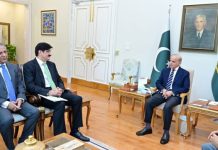DM Monitoring
(By Apoorvanand)
Their body language seemed to suggest that it was an unexpected act of kindness that had come their way.
Generally, police and security forces evoke fear and people want to create a distance from them, but this effort of a group of women and men endearing themselves to this arm of the state were a new experience for me. Noticing our presence, the elderly woman briskly walked towards us. We were also offered tea. A thought crossed my mind that it was not meant for us and we should not take it, but the temptation of engaging her in conversation resolved this ethical dilemma. Her group gathered around my friends and me. I thanked her for the tea, and we started chatting.“We were not the rightful beneficiaries,” I joked. “Was the tea not meant for those security people?” I asked.
She generously replied that since we also looked tired, she had felt the tea would do us good too.“So, do you do this regularly?” I asked.
“We have to! These poor people are working day and night for us, after all. Had they not been here, god knows what would have happened to us,” she replied.
Clearly, she believed what she was telling us. We could see that she was a Hindu.I responded: “So you feel safe with them around you.”
She said: “Of course! You had to be here on February 24 and 25 to feel the palpable air of violence. We could have been killed.”
She owned a shop on that road. It was intact, open and doing business. Other shops on that side of the road, known in current parlance as ‘Hindu’ shops, had also been left untouched by the violence that had targeted mostly Muslim shops, looting, burning and destroying them completely.
Shops owned by Hindus but rented by Muslims had also faced the wrath of the attackers, but with a difference. The mob that had no compunction torching ‘Muslim’ shops had left the ‘Hindu-owned but Muslim-rented’ shops un-burnt, confining itself to looting the Muslim shopkeeper’s stuff in it. It was there for everyone to see that the only shops that were open on that day were those owned by Hindus; there were no Muslims to be seen before the remains of their shops.
I was therefore slightly taken aback that Hindus felt they were the real target of the violence. I spoke to the woman: “But what we are seeing is Muslim houses and properties looted and burnt! Hindu shops do not seem to have suffered that kind of damage.”
She had a ready answer: “We were saved by these brothers.”
She pointed towards the CRPF personnel and continued: “There was no one, not even the Delhi police to be seen when we were under attack by them! In fact, it was only after Sudhir Chaudhary came and showed everything [on his television channel] that these people came to save us.”
She was trying to recall the name of the channel for which Chaudhary works.
We explained that Muslims had suffered more in the violence in her area as there was nothing left of their shops and houses, but she stuck to her point that it was Hindus who had been targeted and that their real loss was not being seen.
The following day we returned to the same area. The first thing I noticed was a group of young men pushing a cart laden with paper plates, cups and cooked food items. I took them to be a relief team, a group of good Samaritans who wanted to feed those who had been forced out of their homes and had lost everything.




